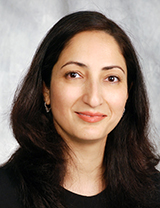For many autistic children and their families, the challenges go well beyond the autism.
Many have simultaneously occurring conditions, known as comorbidities. Attention deficit hyperactivity disorder (ADHD) and anxiety are common in autistic children, and they tend to be more prone than their peers to mood disorders, aggression, temper tantrums, and other disruptive and potentially self-harming behaviors.
Seven in 10 children with autism have at least one comorbidity, and four in 10 have at least two, says Dr. Asima Zehgeer, a UConn Health child and adolescent psychiatrist.
Since last summer, Zehgeer has been holding an autism specialty clinic as part of her practice at UConn Health’s West Hartford office.

“I started realizing that sometimes kids presented with anxiety or some other symptoms and they were never diagnosed with autism,” Zehgeer says. “They would start having problems once they would have more social demands, problems with socialization, and that would cause them to have anxiety and depression. I started realizing that autism is more prevalent. Sometimes it’s not diagnosed until the child reaches a certain age.”
While Zehgeer is capable of providing a clinical diagnosis of autism, her primary focus is on medication management and psychiatric evaluation.
‘A Real Need’
“There’s a real need in the community for child psychiatrists who can manage an autistic population,” says Geraldine Pearson, nurse practitioner and director of UConn Health’s child and adolescent psychiatry practice. “The whole axiom about the mental health system in Connecticut and this country being broken is so true. They’re fragmented. We’re trying to keep them as unfragmented as possible in this clinic, trying to make a continuity of care that families can embrace.”
In some situations, Zehgeer’s assessment can help uncover a previously undiagnosed case of autism. Other times it will rule it out altogether.
But it’s the behavioral and psychological conditions, not the autism itself, that are the main targets of Zehgeer’s specialty clinic. She handles the medication management for those conditions, while community providers or school districts handle the general behavioral interventions such as speech therapy and occupational therapy.
Parents’ Role
There’s little question that parents play a crucial role in the development of their children, and Zehgeer says that’s especially true in autistic children, where that role comes with the added charge of being familiar with—and involved in—the treatment strategy.
That can mean administering medications to manage the comorbidities. It also can mean understanding the behavioral interventions as they reinforce what their child is learning in school.
“They are like the case managers for their children,” Zehgeer says. “It’s like they have their therapists 24/7, so they understand their behaviors better than any therapists can. They help the other providers to help their children. It’s through the parents we can help the best because they know them in and out, their triggers, their strengths, what’s hard for them, what’s not. And they keep on changing, so they give you constant feedback. Based on that feedback you can have effective intervention.”
All parents, Zehgeer says, should understand that mental health problems in children are very common and can have a significant impact on learning and overall development.
“Once they’re educated about these problems and how prevalent they are, they will be able to identify them early on, and get the proper intervention early on, so that it doesn’t reach that level where they’re more challenging and more resistant to treatment,” Zehgeer says. “I think the schools play an important role in educating the parent.”
Zehgeer’s patients range in age from 4 to 17. In her specialty clinic, she sees patients across the autism spectrum, from mild to severe, both verbal and nonverbal.
The UConn Health Child and Adolescent Psychiatry Outpatient Clinic is located at 65 Kane St., West Hartford. More information is available at bit.ly/ChildPsychUCH or by calling 860.523.3745.



